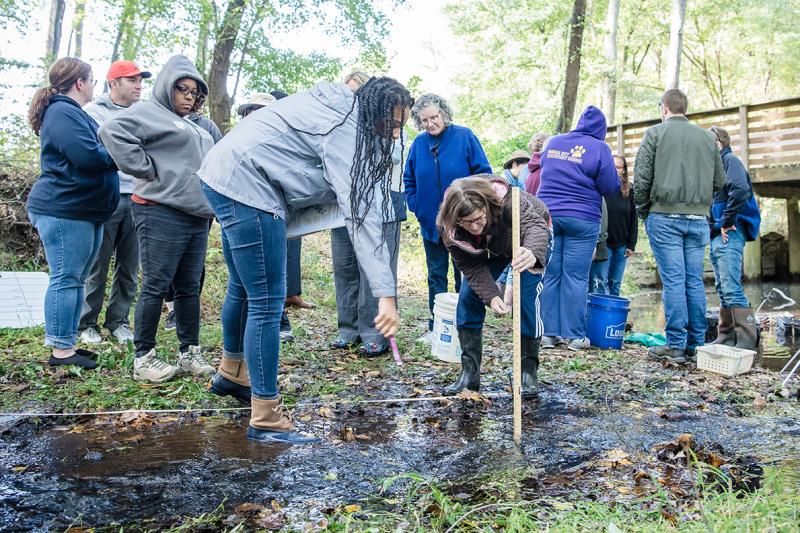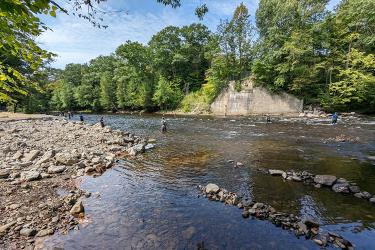NOAA has awarded nine new projects roughly $750,000 in Fiscal Year 2023 funding as part of the Chesapeake Bay-Watershed Education and Training (B-WET) program. The new projects are based in Pennsylvania, Maryland, Virginia, and New York.
Students and teachers around the Chesapeake Bay watershed will benefit from these outstanding programs. This year’s new grants support projects to help school districts deliver Meaningful Watershed Educational Experiences. MWEEs combine outdoor and classroom learning to help students investigate local environmental issues. They lead to students taking informed action, increase school districts’ capacity to deliver environmental education, and support statewide environmental literacy initiatives.
In addition to the new grants, Chesapeake B-WET will also fund 19 continuing projects. They will enable nonprofit organizations and universities to partner with school districts to implement MWEEs that will reach more than 10,000 students and 500 teachers.
These projects all support elements in NOAA’s Strategic Plan, including increasing environmental literacy and encouraging individual planet stewardship actions.
New Fiscal Year 2023 Projects
Maryland
- The Anacostia Watershed Society’s “Mussel Power” project will reestablish healthy mussel populations while engaging high school students in meaningful watershed education experiences.
- Phillips Wharf Environmental Center’s “Oysters as a Keystone Species in the Chesapeake Bay” project will provide in-depth oyster education to all fourth-grade students in Talbot County, Maryland.
- The University of Maryland’s “Thirteen Moons: Indigenous Knowledge and Culturally Responsive Pedagogies for Conservation, Sustainability, and Stewardship” project will establish a new partnership-based network to foster competencies in conservation, sustainability, and stewardship in students through indigenous knowledge and culturally responsive pedagogies.
- The Chesapeake Bay Trust’s “Environmental Literacy Capacity Building in the Chesapeake Region: A Regional Outdoor Learning Network Initiative and Equitable Youth Environmental Education Program in Partnership with NOAA” project will increase regional capacity for environmental literacy planning and implementation across the watershed.
Virginia
- The Elizabeth River Project’s “Our Elizabeth River, Our Responsibility” effort will provide inquiry-based, hands-on, systemic Meaningful Watershed Educational Experience and teacher professional development.
- The Essex County School Board’s “Essex Environmental Literacy Collaborative” project will include a partnership with Friends of the Rappahannock and The Center for Educational Partnerships that will create a systemic and sustainable environmental literacy education program to reach students in the elementary, intermediate, and high schools through targeted grade levels.
- Friends of the Rappahannock’s “Northern Neck MWEE Program” will implement sustainable MWEE programs in school divisions in the Northern Neck region of the Rappahannock River watershed.
New York
- The Otsego County Conservation Association’s “Upper Susquehanna Watershed Project” will establish MWEEs in middle and high school grade bands in two school districts.
Pennsylvania
- The Williams Valley School District’s “Williams Valley School District Environmental Literacy and Sustainability Project” will develop a districtwide, sustainable environmental literacy plan that includes embedding systemic MWEEs (at least one per grade band) into the curriculum at the Williams Valley School District.
B-WET works with students directly and provides professional development to educators. The grants empower students to investigate local and global environmental issues that affect their lives, choices, and communities. Students identify actions to address these issues, helping them understand, protect, and restore their local watershed.
NOAA’s B-WET program started in the Chesapeake Bay watershed in 2002. Over the years, the program has grown from funding smaller projects in individual schools to supporting systemic programs. They ensure meaningful watershed educational experiences for all students in a given school district or even state.



